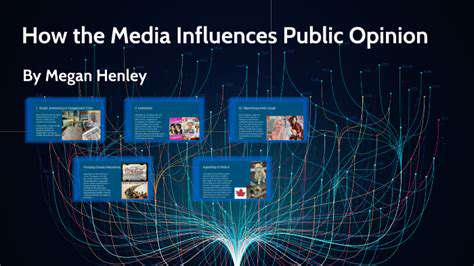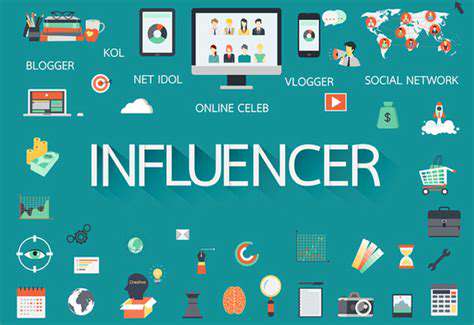The Profound Impact of Social Media Influence on Modern Society
How Social Media Shapes Public Perception

Understanding Public Opinion Formation
Social media plays an essential role in how public opinion is formed today. Through various platforms, individuals express their views, resonate with others, and share content that influences collective beliefs. As a result, social media can rapidly amplify certain opinions while marginalizing others.
The sheer volume of information shared online can create an echo chamber effect, where users are primarily exposed to views that align with their own. This phenomenon contributes to polarized perspectives on critical issues. Being aware of these dynamics is essential for individuals to critically engage with content they consume.
Public opinion is not just shaped by personal experience; it is heavily influenced by what is trending online. Trending topics can dominate conversations and overshadow nuanced perspectives. Therefore, discerning fact from opinion becomes increasingly challenging in a sea of digital noise.
Additionally, the role of influencers in shaping public perception cannot be overlooked. Influencers serve as intermediaries, often swaying public opinion on products, politics, and social issues with their endorsements. Understanding how these influencers operate is vital for discerning the motivations behind their messages.
The Role of Algorithms in Content Discovery
The algorithms that power social media platforms significantly influence which content individuals encounter. These algorithms are designed to prioritize engagement, often pushing sensational or emotionally charged content to the forefront. This prioritization can distort the public's perception of reality, as it often fails to reflect a balanced view of issues.
Users may find themselves trapped in a feedback loop, where their interactions lead to increasingly narrow content exposure. As a consequence, many become entrenched in specific viewpoints, unable to see the broader context. Understanding how algorithms function can equip users to intentionally seek diverse perspectives.
Moreover, these algorithms can impact the spread of misinformation. False narratives can gain traction rapidly, exacerbating societal issues and hindering informed decision-making. Social media companies are continually challenged to address these concerns while maintaining user engagement.
Critically, the consequences of algorithm-driven content discovery extend beyond individual perspectives; they can shape community beliefs and societal norms as a whole. This cyclical influence reinforces the importance of digital literacy and education on media consumption.
The Influence of Social Movements and Activism
Social media has become a powerful tool for social movements and activism, allowing marginalized voices to find an audience. Digital platforms provide a space for organizing protests, raising awareness, and pushing for change. This democratization of information has empowered individuals to engage in issues that matter to them.
Hashtags often serve as rallying points for movements, making it easy for users to connect and mobilize around shared causes. This connectivity has resulted in global movements that can rapidly gain momentum. The speed at which social movements can spread highlights the transformative power of social media in modern society.
However, there is a downside to this influence, as social media activism can sometimes be performative rather than substantive. Actions like sharing posts may give individuals a false sense of contribution without leading to meaningful change. Thus, it is vital for activists to encourage authentic engagement and actionable outcomes.
Additionally, the impact of social media on activism persists even after online engagement. Online movements can have real-world implications, shaping policy discussions and altering public opinions on significant issues. This convergence of online and offline activism underscores the need for thoughtful engagement in social media discourse.
Commercialization and Consumer Behavior
Social media platforms have recognized the potential for monetization, becoming key players in global marketing strategies. Brands utilize targeted advertising and influencer collaborations to reach consumers in innovative ways. This shift has transformed consumer behavior, making online engagement a crucial aspect of purchasing decisions.
Companies increasingly rely on social media analytics to understand consumer preferences and trends. As a result, marketing strategies are more data-driven, aiming to maximize engagement and conversion rates. This evolution represents a significant change in how businesses interact with their audiences, as traditional marketing models become less effective.
Nonetheless, this commercialization of social media raises ethical concerns regarding privacy and consumer manipulation. Users are often unaware of how their data is harvested and utilized for marketing purposes. As awareness grows, there is a demand for greater transparency and accountability from companies.
In addition to ethical considerations, the commercialization of social media alters the way individuals perceive their own consumption habits. The pressure to conform to certain trends or lifestyles can lead to feelings of inadequacy or discontent. Thus, navigating this landscape requires both awareness and discernment on the part of consumers.
The Role of Influencers in Marketing Strategies

The Power of Influencer Marketing
Influencer marketing has transformed the way brands engage with their audiences. Traditional advertising methods are becoming less effective, making way for influencers who possess the ability to build strong relationships with their followers.
By leveraging these relationships, brands can promote their products in a more relatable and authentic manner. This approach often leads to higher engagement rates and conversion success, as consumers tend to trust recommendations from those they follow.
Measuring Success and ROI
Determining the effectiveness of influencer partnerships requires a strategic approach to measuring success. Key performance indicators (KPIs) such as reach, engagement rates, and conversion metrics are essential for understanding an influencer's impact.
Investing in influencer marketing can yield significant returns if executed correctly. Brands must analyze these metrics continuously to refine their strategies and ensure they are aligning with their target market's preferences.
The Future of Influencer Collaborations
As social media continues to evolve, so too will the landscape of influencer marketing. Emerging trends such as micro-influencers and niche market targeting are reshaping how brands approach their collaborations.
Staying ahead of these trends will be crucial as companies strive to connect authentically with their consumers. In a world where social media influence is omnipresent, brands must adapt to remain relevant and impactful.
Challenges and Ethical Considerations
Understanding the Ethical Dilemmas
Social media platforms have revolutionized the way information is disseminated, but this rapid spread of information also raises significant ethical dilemmas. One major challenge is the propagation of misinformation, where false narratives can be shared widely before they are fact-checked. This not only misleads users but can also have real-world consequences, such as influencing public opinion or political events.
Another ethical consideration is the impact of social media on privacy. As users share personal information, they unknowingly expose themselves to data breaches and privacy violations. The ethical responsibility of social media companies to protect user data and provide transparent policies is critical in maintaining trust.
Additionally, the algorithms that drive social media interactions can perpetuate echo chambers and reinforce biases. Users are often shown content that aligns with their existing beliefs, limiting exposure to diverse viewpoints. This raises questions about the ethical responsibility of platforms to promote balanced discourse and safeguard democracy.
The Psychological Effects of Social Media
The use of social media can significantly affect mental health, leading to various psychological challenges. One major issue is the phenomenon of social comparison, where users measure their worth against the curated lives of others, fostering feelings of inadequacy. This constant exposure can lead to anxiety, depression, and low self-esteem, especially among young users.
Furthermore, the addictive nature of social media can disrupt personal relationships and lead to isolation. People may prioritize online interactions over face-to-face relationships, which can diminish the quality of their social connections. This shift in engagement can negatively impact emotional well-being and social skills.
Lastly, cyberbullying has emerged as a serious concern, particularly among teenagers. The anonymity of the internet can promote aggressive behavior and harassment that affect victims emotionally and psychologically. Addressing this issue requires not only individual responsibility but also systemic changes within social media platforms.
The Future of Social Media Regulation
As the influence of social media continues to grow, the need for regulation becomes increasingly crucial. Governments and organizations are exploring guidelines to manage the responsibilities of social media platforms in curbing misinformation and protecting users' rights. However, finding a balance between regulation and freedom of expression poses a significant challenge.
There's an ongoing debate about the role of social media companies in moderating content. Many argue that these platforms should take more active measures to combat hate speech, harassment, and misinformation. However, the implementation of stringent regulations could also lead to censorship and the suppression of free speech, raising concerns about who gets to define acceptable content.
Looking ahead, collaboration between governments, social media companies, and civil society is essential to develop effective policies that protect users while ensuring the platforms remain avenues for open dialogue. This is crucial for nurturing a healthy and informed society in the digital age.
The Future of Social Media Influence
The Evolving Landscape of Social Media Platforms
Social media platforms have undergone significant transformations since their inception, adapting to new technologies and user expectations. As new platforms emerge and gain popularity, established networks must innovate to retain user engagement. The rise of short-form video content through platforms like TikTok has shifted the focus from traditional social networking to immersive visual experiences.
Moreover, the introduction of features allowing for live streaming, stories, and ephemeral content has changed how people interact online. Brands and individuals alike now tailor their content to fit these dynamic formats, striving to capture fleeting moments of attention in an increasingly crowded digital space.
These changes have far-reaching implications for marketing strategies. Companies must constantly evaluate their approaches, utilizing influencers who master new platform trends to connect authentically with their audiences. This evolution creates both opportunities and challenges for stakeholders in the social media landscape.
As competition intensifies, the future may see the blending of social media with other digital experiences, leading to even more innovative ways for users to connect and share information globally.
The Role of Influencer Marketing in Business Growth
Influencer marketing has emerged as a cornerstone strategy for many businesses, particularly in the digital age. Brands now rely on shared values and audience alignment when selecting influencers, leaning towards authenticity over sheer follower numbers. This shift emphasizes the importance of trust and relatability in consumer relationships.
With influencers often seen as thought leaders in their niches, their endorsements can significantly impact brand perception and purchasing decisions. Research shows that consumers are more likely to engage with brands that utilize relatable influencers, highlighting the effectiveness of micro and nano influencers who have smaller but highly engaged audiences.
Furthermore, brands can leverage influencer partnerships to create targeted campaigns that resonate with specific demographics. By aligning messaging with influencers who embody the brand's values, companies can enhance their credibility and build a loyal customer base.
As influencer marketing continues to evolve, businesses will increasingly adapt their strategies to focus on long-term partnerships and community engagement, moving beyond one-off promotions for better sustained impact.
The Risks and Ethical Considerations of Social Media Influence
Despite the benefits of social media influence, there are inherent risks and ethical considerations that must be addressed. The prevalence of misinformation and misleading content poses significant challenges, as influencers may inadvertently spread false claims or products lacking transparency. This can undermine trust not only in the influencer but also in the brands they represent.
Additionally, the pressure to maintain an idealized online persona can lead to mental health issues for influencers, who may struggle with the constant need for validation through likes and comments. This phenomenon extends to their followers, as unrealistic portrayals of life can foster dissatisfaction and unhealthy comparisons.
Brands partnering with influencers must navigate these ethical waters carefully, emphasizing authenticity and responsible messaging. Clear guidelines and transparent communication about partnerships are vital in fostering trust with audiences.
Finally, regulatory bodies are increasingly scrutinizing influencer marketing practices, advocating for disclosure of partnerships and sponsored content. Brands and influencers alike must stay informed about these regulations to avoid legal repercussions and ensure ethical practices in their promotions.